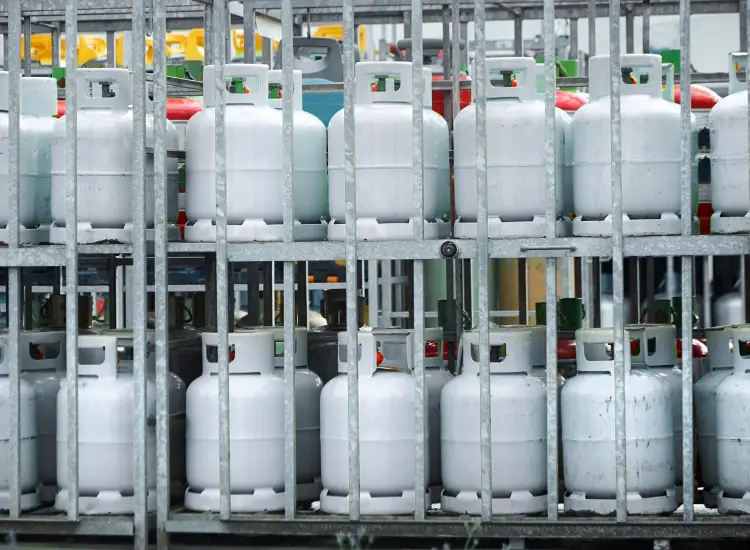Where to Store Small Propane Tanks? The Ultimate Guide for Safety & Convenience

If you’ve ever wondered where to store small propane tanks, you’re in the right place. The safety and proper storage of propane tanks are crucial to prevent accidents and ensure the longevity of the tanks. In this article, we’ll explore different storage options and provide some tips to help you store your small propane tanks safely and conveniently.
Whether you use small propane tanks for your camping trips, grilling sessions, or other outdoor activities, finding the right storage solution is essential. We’ll discuss both indoor and outdoor storage options, including safety guidelines and best practices for each. So let’s dive in and discover the best ways to store your small propane tanks!
Quick Links
Why is Proper Storage of Small Propane Tanks Important?
Proper storage of small propane tanks is crucial for both safety and convenience. Storing propane tanks correctly ensures that they are not at risk of damage or leaks, which can lead to accidents or injuries. Additionally, proper storage helps to prolong the lifespan of the tanks and keep them in good working condition. By following safety guidelines and implementing appropriate storage methods, you can minimize the risks associated with propane tanks and ensure that they are readily accessible when needed.
In the following sections, we will explore indoor and outdoor storage options for small propane tanks, considerations for storing them in a garage, safety precautions to follow, and tips for organizing and labeling the tanks for easy identification. We will also discuss how to properly store unused small propane tanks and provide guidance on their proper disposal.
Indoor Storage Options for Small Propane Tanks
- Propane Cylinder Cage: A propane cylinder cage is a secure storage option that keeps small propane tanks organized and protected. These cages are usually made of steel and feature a lockable door for added security.
- Propane Cabinet: A propane cabinet is a dedicated storage unit designed specifically for propane tanks. These cabinets are ventilated to prevent the buildup of gas and are equipped with safety features such as fireproof construction and secure locking mechanisms.
- Propane Tank Stand: A propane tank stand is a simple and convenient storage option. These stands elevate the tanks off the ground, reducing the risk of damage and making them easier to access.
- Wall Mount: Wall-mounted storage racks or brackets can be used to hang small propane tanks on a wall, saving floor space and keeping them within reach.
- Utility Room: If you have a utility room or storage area with proper ventilation, it can be a suitable location for storing small propane tanks. Ensure that the area is well-ventilated and away from any potential sources of ignition.
When storing small propane tanks indoors, it is important to consider safety precautions such as keeping them away from heat sources, open flames, and flammable materials. Additionally, ensure that the storage area is well-ventilated to prevent the buildup of gas. Following these guidelines will help ensure the safety and convenience of storing small propane tanks indoors.
Outdoor Storage Options for Small Propane Tanks
- Propane Tank Cabinets: Invest in a sturdy propane tank cabinet specifically designed for outdoor storage. These cabinets have built-in ventilation and are made of durable materials to withstand outdoor conditions.
- Propane Tank Cages: Propane tank cages provide added security and protection for small propane tanks. They are typically made of metal and have lockable doors to prevent unauthorized access.
- Propane Tank Sheds: If you have multiple small propane tanks, consider using a dedicated propane tank shed. These sheds are designed to store propane tanks safely and securely, keeping them protected from the elements.
- Propane Tank Covers: Use a propane tank cover to shield small propane tanks from direct sunlight and adverse weather conditions. These covers are usually made of weather-resistant materials like vinyl or polyester.
- Propane Tank Stands: Elevating small propane tanks on a secure and stable propane tank stand can help prevent damage and corrosion. These stands are typically made of metal and provide a stable base for the tanks.
- Propane Tank Mounts: Install permanent propane tank mounts on the exterior of your property to securely hold small propane tanks. These mounts are typically made of metal and can be attached to walls or fences.
- Propane Tank Brackets: Use propane tank brackets to securely fasten small propane tanks to structures like walls or posts. These brackets are designed to hold the tanks in place and prevent them from tipping over.
When choosing an outdoor storage option for small propane tanks, consider factors such as the size of your tanks, the number of tanks you need to store, and the available space in your outdoor area.
Considerations for Storing Small Propane Tanks in a Garage
So – let’s talk garage. When it comes to storing small propane tanks in a garage, there are several important considerations to keep in mind. This ensures both safety and convenience for you and your household. Here are the key factors to consider:
Ventilation
Proper ventilation is crucial when storing propane tanks in a garage. Propane is a flammable gas, and any leaks or buildup of gas can be hazardous. Ensure that there is sufficient airflow in the garage to prevent the accumulation of propane fumes. Open windows or use fans to maintain a well-ventilated environment.
Temperature and Heat Sources
Propane tanks should be stored in areas with controlled temperatures. High temperatures can cause the pressure inside the tank to increase, which may lead to leaks or even explosions. Avoid storing propane tanks near heat sources, such as water heaters, furnaces, or electrical appliances that generate heat.
Stability and Secure Storage
It is important to store propane tanks in a stable and secure manner. Ensure that they are placed in an upright position and well-supported to prevent tipping or falling. Consider using a sturdy storage rack or a designated storage cabinet to keep the tanks secure and prevent any accidents.
Away from Ignition Sources
Keep propane tanks away from any potential ignition sources. This includes open flames, sparks, or electrical outlets that can create a spark. Propane is highly flammable, and even a small ignition source can cause a fire or explosion. It is best to store propane tanks at a safe distance from such sources to mitigate any potential risks.
STRICT No Smoking Policy
Enforce a strict no smoking policy in the garage to avoid any accidental ignition of propane fumes. Smoking near propane tanks is extremely dangerous and can lead to a fire or explosion. Make sure everyone in the household is aware of this policy and follows it at all times.
Safety Precautions for Storing Small Propane Tanks
- Keep tanks outdoors: Try your best to keep them outdoors. That’s #1. It is important to store small propane tanks outdoors in a well-ventilated area. Propane is a flammable gas, and storing tanks indoors can increase the risk of fire or explosion.
- Avoid direct sunlight and extreme temperatures: With that being said, propane tanks should be stored in a shaded area away from direct sunlight, as prolonged exposure to high temperatures can cause the pressure inside the tank to increase. Extreme heat or cold can also affect the integrity of the tank.
- Store upright and secure: Small propane tanks should always be stored in an upright position to prevent leaks. Ensure that the tanks are properly secured to prevent them from falling or rolling.
- Keep away from ignition sources: Propane tanks should be kept away from ignition sources such as open flames, sparks, or electrical equipment that can generate sparks. This includes storing them away from areas where smoking is permitted.
- Store in a well-ventilated area: Proper ventilation is crucial for storing propane tanks safely. Avoid storing tanks in enclosed spaces or areas with poor ventilation, as propane is heavier than air and can accumulate in low-lying areas.
- Check for leaks: Before storing propane tanks, always check for any signs of leaks. This can be done by applying a mixture of soap and water to the valve and connections. If bubbles appear, there may be a leak, and the tank should not be stored until it has been inspected and repaired.
Following these safety precautions when storing small propane tanks can help minimize the risk of accidents and ensure that propane is stored safely. It is important to consult local regulations and guidelines for specific storage requirements in your area.
Tips for Organizing and Labeling Small Propane Tanks
If you’ve noticed a trend, the key here is proper organization. Here are some helpful tips to keep your propane tanks organized and easily identifiable:
Designated Storage Area
Choose a designated storage area specifically for your small propane tanks. This will help keep them organized and prevent any accidental damage or leaks.
Categorize by Size or Type
Categorize your small propane tanks based on size or type. For example, you can group together tanks of the same size or tanks used for similar purposes (e.g., camping vs. grilling). This makes it easier to locate the specific tank you need.
Proper Ventilation
Ensure that your storage area has proper ventilation to prevent the build-up of propane fumes. Propane tanks should always be stored in a well-ventilated area, away from heat sources or open flames.
Secure Storage Rack or Shelf
Invest in a secure storage rack or shelf specifically designed for holding small propane tanks. This will help prevent them from falling or tipping over, reducing the risk of accidents.
Label Tanks
Label each small propane tank with its intended use or contents. This will make it easier to identify which tank is suitable for a particular application and prevent mix-ups.
Regular Inspection
Regularly inspect your small propane tanks for any signs of damage or leaks. If you notice any issues, it’s important to address them immediately to maintain safety.
By following these tips, you can ensure that your small propane tanks are stored in an organized and safe manner, making them easily accessible whenever you need them.
Proper Disposal of Small Propane Tanks
So this get’s asked often – and I’ve covered this while discussing refilling small propane tanks, but it’s worth repeating. When it comes to disposing of small propane tanks, it is important to follow proper guidelines to ensure safety and environmental responsibility.
Propane tanks can be very hazardous if not disposed of correctly, as they may contain flammable gas residue. Here is a brief overview followed by a numbered list of steps to properly dispose of small propane tanks:
- Empty the tank: Before disposing of a small propane tank, ensure that it is fully empty. Never dispose of a partially filled tank.
- Release any remaining gas: If there is any gas left in the tank, it must be released in a safe manner. Avoid releasing gas into the air or near open flames or sparks.
- Check local regulations: Research your local regulations or contact the appropriate authorities to determine the specific guidelines for propane tank disposal in your area.
- Take it to a recycling center: Many recycling centers accept propane tanks for proper disposal. Check with your local recycling center to see if they accept small propane tanks and if there are any specific requirements for drop-off.
- Return to the retailer: Some retailers that sell propane may have a program in place for tank recycling. Inquire with the retailer where you purchased the tank to see if they offer this service.
- Call a hazardous waste facility: If there are no recycling options available, contact your local hazardous waste facility for guidance on proper disposal.
Proper disposal helps prevent accidents, protects the environment, and promotes overall safety in your community.
Final Thoughts
Proper storage of small propane tanks is crucial for both safety and convenience. By following safety guidelines and implementing appropriate storage methods, you can minimize the risks associated with propane tanks and ensure that they are readily accessible when needed.
Whether you choose indoor storage options such as propane cylinder cages or utility rooms, or outdoor storage options like propane tank cabinets or tank covers, it is important to consider factors such as ventilation, stable storage, and keeping the tanks away from ignition sources.
Proper storage and disposal of small propane tanks not only ensure safety but also contribute to the well-being of your community and the environment. Remember to follow safety precautions, organize and label your tanks, and dispose of them responsibly.







